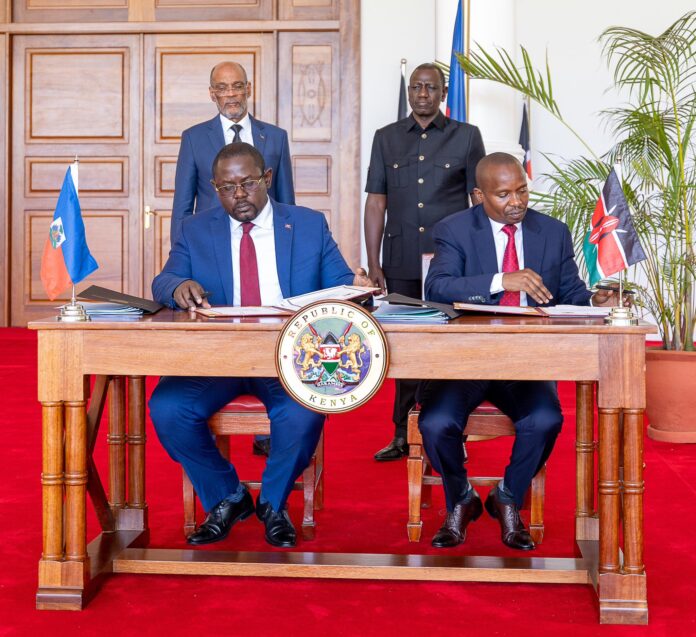In a significant move towards combating the escalating gang violence in Haiti, Kenya and Haiti have inked a groundbreaking agreement. The accord, signed on Friday, entails the deployment of Kenyan police officers to spearhead a UN-backed mission aimed at restoring law and order in the gang-plagued Caribbean nation.
Kenya and Haiti sign agreement on the deployment of 1,000 police officers to the Multi-National Security Support Mission in Haiti. pic.twitter.com/vJtzFoDQ99
— William Samoei Ruto, PhD (@WilliamsRuto) March 1, 2024
Kenyan President William Ruto, alongside Haitian Prime Minister Ariel Henry, affirmed their commitment to expedite the deployment process during their discussions. This pivotal agreement marks a crucial step forward in addressing the urgent plea from Haiti’s government for international assistance in quelling the rampant violence that has claimed thousands of lives and devastated the country’s economy and public health system.
Eliud Kipchoge’s Heartfelt Tribute to Kelvin Kiptum Ahead of Tokyo Marathon
Previously, Kenya had pledged to provide up to 1,000 personnel, garnering support from the United States and other nations. However, a legal setback arose when a Nairobi court deemed the deployment unconstitutional due to the absence of a reciprocal agreement between the two countries. In response, President Ruto and Prime Minister Henry witnessed the signing of a reciprocal agreement in Nairobi, laying the groundwork for the deployment to proceed.
President Ruto reiterated Kenya’s unwavering commitment to the multinational mission, emphasizing the global significance of fostering peace in Haiti. Despite facing criticism and legal challenges, Ruto framed Kenya’s involvement as a humanitarian imperative, aligning with the nation’s longstanding tradition of contributing to peacekeeping efforts worldwide.
Legal Battle: Application to exhume Kibaki’s remains for DNA analysis in court
Haiti, plagued by political turmoil and the assassination of President Jovenel Moise in 2021, has been grappling with a leadership vacuum and a lack of electoral stability. The agreement comes at a crucial juncture as Haiti endeavors to navigate its way toward democratic governance and stability.
The multinational mission, initially sanctioned for one year, envisages Kenyan police collaborating with their Haitian counterparts in confronting the entrenched gang violence. Notably, several other countries, including the Bahamas, Bangladesh, Barbados, Benin, and Chad, have also pledged their support to the Kenya-led policing mission, underscoring the collective resolve to address the pressing security concerns in Haiti.
As Haiti continues to reel from the devastating impact of violence, the agreement signifies a beacon of hope, signaling international solidarity and concerted efforts to alleviate the suffering of its people. With the support of Kenya and other contributing nations, Haiti is poised to embark on a path towards peace, stability, and ultimately, a brighter future for its citizens.
Raila Odinga’s AU Leadership Ambition Hangs in the Balance Amid New Electoral Rules
Diplomatic Discourse: Ruto, Museveni, and Raila Forge Bonds in Uganda
Divine Intervention: Benny Hinn Prays for Charlene Ruto to Find a Husband


